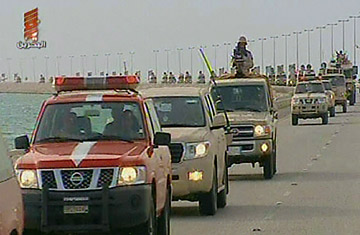
An image from Bahrain TV shows troops traveling across a causeway from Saudi Arabia to Bahrain on March 14, 2011
Many of the small children wandering a protest site in front of the King's palace in Safriya on March 12 were garbed in simple white cotton shifts — traditionally used as a signal that the person is ready to die. It was symbolic of the violent turn Bahrain's once peaceful protests have taken. A three-month state of emergency went into effect on Tuesday in the small island nation, and the violence looks to intensify in the next few days, with an impending curfew in all cities and reports of gangs of thugs patrolling the streets with clubs and setting up checkpoints on main roads.
The increasingly bloody confrontation between the mostly Shi'ite protesters and their Sunni King, Hamad ibn Isa Al Khalifa, led the monarch to ask for backup on March 13 from the Joint Peninsula Shield, the military coalition established to protect members of the Gulf Cooperation Council (GCC) from invasion. On March 14, more than 100 Saudi tanks rolled across the causeway that links Saudi Arabia and Bahrain in an effort to quell the uprising and save Bahrain's royal regime. Saudi Arabia's arrival marks the first time an outside country has intervened in a protest since the wave of unrest began in the Arab world in January.
Saudi Arabia "doesn't want its neighbor going into a free fall of political instability," says John Sfakianakis, chief economist at Banque Saudi Fransi in the Saudi capital of Riyadh. "The message the Saudis are sending is that they and the GCC will act as a force to keep these countries safe and secure."
On Tuesday afternoon, a Saudi official told the Associated Press that a Saudi soldier had been shot dead by a Bahraini protester, though the report was unconfirmed. "People are insisting more now on the fall of Hamad," says Hasan, 25, a Manama banker who is one of the protest movement's organizers. "Saudi troops are no different to us" than Bahraini soldiers, he adds.
Saudi Arabia's unexpected military action could further anger not only the protesters in Manama but also leaders in Iran, perhaps leading the island nation to become the scene of a proxy war. Iran has long had an interest in dominating the Persian Gulf. Stratfor's John Friedman wrote in a position paper on March 14 that the larger uprising's spread to Bahrain represented a "golden opportunity" for Tehran. "The Iranians are accustomed to being able to use their covert capabilities to shape the political realities in countries," he wrote, something they did effectively in Iraq. "The Saudis, recognizing that this posed a fundamental risk to their regime and consulting with the Americans, have led a coalition force into Bahrain ... pressed by covert forces, they were forced into an overt action they were clearly reluctant to take."
Indeed, Tehran has started to saber-rattle in the wake of the Saudi intervention. Iranian Foreign Ministry spokesman Ramin Mehmanparast said on Tuesday at a news conference that "the presence of foreign forces and interference in Bahrain's internal affairs is unacceptable and will further complicate the issue." Iran now faces options as to how it could capitalize — or not — on Bahrain's instability. "If Tehran does not act, it misses a key opportunity to further destabilize the political situation in the Gulf and increase its own power," Freidman said.
Iran could force fighting on the ground or agitate for unrest elsewhere in the GCC, weakening Saudi forces. It could also attempt an intervention of its own, by sea, though a likely counter from the U.S.'s Fifth Fleet would be, Friedman wrote, a "disaster" for Tehran. "Iran is obviously watching the situation in Bahrain very closely" and will likely act soon, Sfakianakis says.
On March 11, Bahraini forces fired tear-gas canisters and rubber pellets from close range, threw large rocks and stabbed at least four protesters after a march to the King's palace in Riffa, the first time the protesters had demonstrated at the royal home. The two palaces in Manama are "symbols of repression, the center of human-rights violations," said Nabeel Rajab, president of the Bahrain Center for Human Rights, who stood in the center of a crowd draped in the Bahraini flag, holding flowers and chanting, "Down, down with the Khalifa."
"The King told us this is his 'zone,' but all of Bahrain should be his zone. He never thought we'd come up here," a protester said while walking the route. Said another man: "Out is the only place for him."
